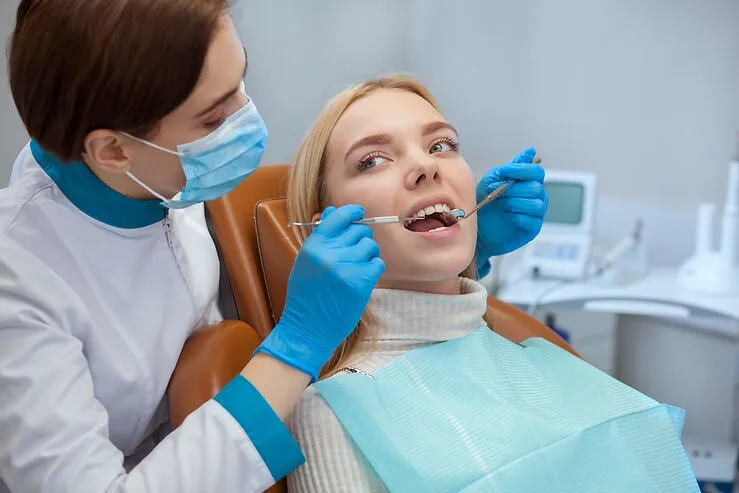
Emergency dentistry involves dental procedures and treatments dedicated solely to resolving urgent issues with the gums and teeth. A dental emergency is a potentially dangerous and stressful situation that needs immediate treatment and can occur any time without any prior notice. In the case of a dental emergency, you need the professional services of a trusted emergency dentist in North York, Toronto. Whatever your dental emergency is, contact Chroma Dental now at (416) 550-9000.
Emergency Dental Care with Chroma Dental
At Chroma Dental, our team of emergency dentists and dental hygienists has made it their mission to deliver high-quality dental emergency services that make a difference with our patients’ overall oral health.
Depending on the nature of your dental issue, you probably experienced extreme pain and went through a lot of inconvenience in the process. When you experience severe pain in your mouth, a displaced tooth stuck in your gums or a tooth that has been accidentally knocked out; it’s very important to plan a visit to your dentist immediately.
Types of Common Dental Emergencies
Here are some of the common dental emergencies and how to handle them from home until you can visit the emergency dentist:
– Damaged Teeth
If your tooth has cracked, chipped, or broken off, don’t panic. A damaged tooth is not typically considered a dental emergency. However, it is worth monitoring to ensure that the tooth is not causing you excessive pain or swelling. If the tooth starts to hurt or swell, or you have had a tooth or teeth completely knocked out or displaced, contact the Chroma Dental team right away.
– Soft Tissue Injuries and Fractured/Swollen Jaw
A swollen jaw could be a soft tissue injury where localized swelling should start to dissipate after a few days. Sometimes it could also be a sign of dislocated or broken jaws.
Although the severity of pain may vary, individuals with broken or dislocated jaws may exhibit symptoms such as difficulty chewing food, talking, and opening the mouth. They may have excessive salivation, malocclusion (improper meshing of the upper and lower teeth), skin discoloration, difficulty breathing, and visible jaw deformity. It is crucial to keep the mouth clean with saltwater during mouthwashes to prevent further infection. Treatments may vary, so our team is here to help alleviate concerns and provide you with the care you need.
– Loose Tooth – Tooth Out of Alignment
- A Knocked-Out Tooth
If a tooth has been completely knocked out it is a race against time to save it. This type of dental emergency is serious. A permanent tooth can sometimes be put back into its socket. It is recommended to visit an emergency dentist within the first hour or sooner. After that, the chances of saving the tooth start to diminish significantly. This loose tooth is stabilized with a splint. After a few weeks, the tooth ligament (hopefully) re-attaches to the jawbone, after which you need a root canal treatment to complete your tooth’s rehabilitation. The same urgency needs to be taken with broken and chipped teeth. - Tooth Displacement/Luxation
It happens that after an injury, a tooth remains in the socket although it has been displaced and protrudes at an unnatural angle. If this happens to a permanent tooth, emergency dental services should be sought to prevent infection and to save the tooth. Splinting should be done to stabilize it, but a root canal will be required to remove damaged nerves.
– Toothache
Tooth pain is one of the most common dental emergencies. It can be caused by any number of issues, and it will worsen if left untreated for a long period of time. The first thing to do when experiencing tooth pain is to visit an emergency dentist as quickly as possible so that they can determine what’s causing the pain and start treating the problem right away. Advil can be consumed to alleviate the dental pain temporarily.
– Infected Tooth
An infected tooth is usually accompanied by swelling, redness, or pus around the affected area. Once again, this problem needs treatment as soon as possible, which may well take the form of a root canal if the tooth is decayed and bacteria have reached the dental pulp—the center of the tooth that holds soft tissues, such as nerves.
– Issues With Dental Restoration
Dislodgement of temporary crowns and fillings doesn’t constitute a dental emergency; however, if a permanent dental crown comes off, it is important to see an emergency dentist.
Meanwhile, to hold the crown in place, denture adhesive, Vaseline or toothpaste is applied on the inside of the crown, while a clean gauze piece or dry cloth is held in between the teeth, and pressure is applied via biting so that the crown sets in occlusion. Afterward, a visit to emergency dentists should be planned so that the damage can be fixed appropriately.
Call us: (416) 550-9000
Common Signs of a Dental Emergency
Here are some of the guidelines to determine if you are dealing with a true dental emergency or not:
- Thermal sensitivity leading to pain generally and on biting down.
- Gum or mouth bleeding.
- Mouth or facial pain with severe intensity.
- Knocked out/loose tooth with some attachment.
- Dental or facial trauma.
- Mouth, facial, or gum swelling.

Trust Our Emergency Dentist in North York, Toronto
The dental emergency requires immediate attention by an experienced emergency dentist. An emergency visit to the dentist is advisable as soon as possible. Contact Chroma Dental right away for your essential dental care needs, our emergency dentists are always ready to help.
Call us: (416) 550-9000













